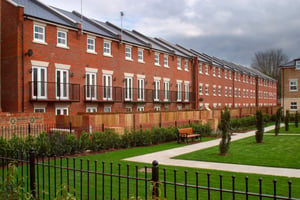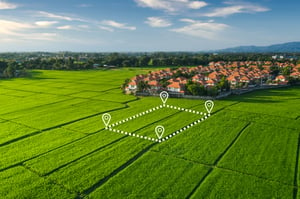New government Biodiversity Net Gain (BNG) legislation is coming into play for housing developers in the UK in February 2024, to help ensure natural environments are not just protected but actually ‘nature positive’.
It’s crucial for housing developers to get their heads around the detail of the mandatory regulations now, and work closely with their local authorities to understand the steps they will need to put in place to plan how they will meet BNG requirements for developments being planned after the February deadline.
When and where does BNG come into effect for housing developers?
February 2024 is the official timing when the UK government will be introducing mandatory BNG targets for new developments. The exact day when legislation goes live is still to be confirmed (as of September 2023).
Under the Town & Country Planning Act (TCPA), house builders will be required to demonstrate they are delivering at least a 10% net gain in biodiversity for each new development and how it will be maintained for 30 years.
At a local level, the minimum 10% requirement may even be increased by local authorities following February to allow margin for error.
The new BNG requirement will only apply to England. More information on BNG implementation in Scotland is available from CIEEM here and Welsh government guidance on planning policy for developments in Wales can be found here.
There are some exemptions to the new February regulations – developments meeting the following criteria have until April 2024 to deliver mandatory BNG:
- If the development impacts a habitat smaller than 25 metres squared, or 5 metres for more linear habitats (e.g. hedgerows or watercourses)
- Development applications from individual householders e.g. small scale self-build projects
- Biodiversity gain sites (developed specifically for enhancing wildlife habitats)
How does BNG work?
For net gain to be proven, house builders need to calculate the level of biodiversity on a site before development begins, and then ensure they have plans in place to deliver a 10% net gain on this baseline figure – at a minimum.
 This can be done by creating or enhancing habitats for flora and fauna, investing in landscaping or adding green infrastructure on the new build site.
This can be done by creating or enhancing habitats for flora and fauna, investing in landscaping or adding green infrastructure on the new build site.
Read our LAND360 blog on different ways for housing developers to start improving on-site biodiversity now.
Alternatively, habitats could be invested in off-site, on land holdings or through habitat banks.
If developers are unable to deliver at least 10% net gain in biodiversity on-site or via the off-site market, Natural England’s biodiversity credits scheme is accessible as a last resort. This allows developers to purchase biodiversity credits to reach the legal requirement – but at a higher price than the going rate in the private market.
Is BNG a legal requirement for housing developers?
The existing National Planning Policy Framework, published in 2021, is fairly vague around BNG expectations for housing developers. It recommends that
However, the new BNG policy coming in February 2024 changes things. The Environment Act will now be enforcing that housing developers must use the latest version of the Biodiversity Metric Tool to produce precise and consistent calculations of a BNG baseline and forecasted net gains.
It’s anticipated that Biodiversity Metric 4.0 (latest version as of March 2023) will form the basis of the statutory metric needed to be used.
Do developers need a BNG plan?
The new legislation also states that property builders will need to submit a biodiversity gain plan to their local planning authority for approval. This plan will need to be given the green light before building work commences, and ecologist input is strongly advised for successful outcomes. This is where the knowledge and experience of Fera’s LAND360 team is incredibly valuable.
Within the mandatory BNG rules, the Environment Act specifies that a biodiversity gain plan should cover:
- Actions to minimise adverse impacts on wildlife and plant habitats
- Data on the biodiversity value of both the onsite habitat, pre and post development, and any offsite habitat linked to the project
- Whether any biodiversity credits have been purchased to achieve the statutory 10% net gain
- How the plan will be sustained to deliver for at least 30 years
Source: Planning Advisory Service
How can housing developers prepare for mandatory BNG?
With the non-negotiable BNG legislation looming, Natural England has strongly advised developers get prepared for the February mandate by taking these steps now:
- Consider how BNG could be achieved at the site selection and design phase of development projects
- Start building partnerships with organisations that could offer opportunities for on-site and off-site for BNG delivery
- Invest in ecological expertise to help with designing a BNG plan in accordance with best practice principles and standards
Source: Natural England Biodiversity Net Gain Brochure
What support is available to help developers deliver mandatory BNG?
Science and ecology plays a crucial role in sustainable development, therefore expert support around BNG plans is invaluable to help house builders meet their own sustainability agendas, as well as enhance the communities they are creating.
Our LAND360 experts can support housing developers with complex processes, such as creating a baseline of their current biodiversity status, spotting opportunities to invest in BNG and setting out a biodiversity gain plan.
 "An understanding of the role of science and a unique level of insight into habitats and natural resources is vital for developments to be sustainable. This service will really enable house builders to achieve this and meet their own sustainability agendas as well as enhance the communities they are creating"
"An understanding of the role of science and a unique level of insight into habitats and natural resources is vital for developments to be sustainable. This service will really enable house builders to achieve this and meet their own sustainability agendas as well as enhance the communities they are creating"
- Paul Brown, Senior GI Remote Sensing Specialist, Fera Science
For more information on measuring the impact of these changes, click here.
More about LAND360
LAND360 is Fera's cutting-edge natural capital assessment service. Launched in 2022, it empowers farmers, landowners, estate managers, and housing developers to make informed land use decisions. By accurately measuring and mapping existing land habitat features and modelling biodiversity offerings, LAND360 is a vital tool in the quest for sustainable development and biodiversity enhancement.
